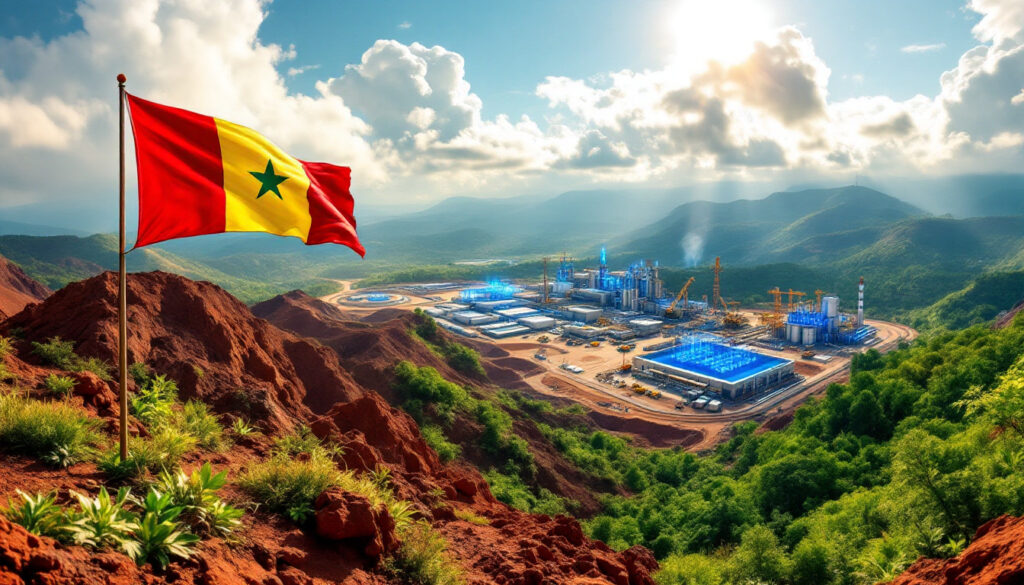How is Guinea reforming its mining sector through permit cancellations?
Guinea's transitional government has taken decisive action to enforce compliance within its mining sector by instructing officials to cancel permits and concessions from companies failing to meet their contractual obligations. This strategic move aims to ensure that foreign mining companies operate in accordance with Guinea's development goals and legal frameworks.
The timeline is significant—President Mamadi Doumbouya's directive was issued on May 8, 2025, signaling a new era of regulatory enforcement that could reshape the country's mining landscape.
The government's non-negotiable stance on compliance
President General Mamadi Doumbouya has made it clear that adherence to contractual commitments and project timelines is "non-negotiable," signaling a hardline approach to enforcing mining regulations. This policy shift represents Guinea's determination to maximize benefits from its vast mineral resources, particularly bauxite, where the country holds the world's largest reserves.
Minister Fana Soumah reinforced this position in a statement broadcast on Radio Television Guineenne, emphasizing that "Compliance with contractual commitments and deadlines is non-negotiable." This uncompromising stance demonstrates the government's resolve to transform how mining operations contribute to national development.
Target: Companies failing to meet value-addition requirements
While specific companies weren't named in the official announcement, Bloomberg has reported that a unit of Emirates Global Aluminium (EGA) may lose its bauxite mining license due to failure to build a promised alumina refinery. This indicates that value-addition commitments—transforming raw materials into higher-value products within Guinea—are a particular focus of the government's enforcement actions.
The focus on value addition represents a significant shift from Guinea's historical role as merely an exporter of raw materials. By insisting on local processing facilities, the government aims to capture more of the value chain and create a more robust industrial sector.
Why is Guinea canceling mining rights now?
Strategic resource nationalism
Guinea's move reflects a growing trend of resource nationalism across resource-rich African nations seeking to capture more value from their natural endowments. By enforcing stricter compliance with existing agreements, Guinea aims to ensure mining operations contribute more substantially to local economic development.
This approach mirrors similar policies implemented in other nations, such as Indonesia's 2020 nickel export ban, which successfully incentivized substantial investments in domestic smelting and refining facilities. Guinea's leadership appears to be studying these successful models of resource governance.
Value addition as a priority
The government has specifically praised China's State Power Investment Corp. (SPIC) for beginning construction of an alumina processing plant, highlighting this as "an important step in the local processing of bauxite and the industrialization of the country." This public commendation serves as both encouragement for compliant operators and a warning to those failing to meet similar obligations.
The distinction between raw bauxite mining and higher-value alumina processing is critical to understanding Guinea's policy shift. Alumina production represents a significant step up the value chain, requiring more sophisticated technology and creating more skilled employment opportunities.
Securing greater economic benefits
As the world's leading producer of bauxite, Guinea has significant leverage in demanding more from mining companies. The enforcement action aims to ensure that the country's position in global mineral supply chains translates into tangible economic benefits through industrialization, job creation, and technology transfer.
While raw bauxite exports have generated revenue, they've failed to catalyze broader economic development. The government's focus on processing facilities aims to create a more diverse economic ecosystem around Guinea's mineral wealth, with potential bauxite project benefits extending beyond simple extraction.
What are the implications for mining companies operating in Guinea?
Immediate risk assessment for non-compliant operators
Companies with mining rights in Guinea now face urgent pressure to evaluate their compliance with contractual obligations, particularly regarding:
- Construction of processing facilities within agreed timelines
- Meeting development milestones for infrastructure projects
- Fulfilling local content requirements in workforce and supply chains
- Honoring financial commitments including taxes and community development funds
The case of Emirates Global Aluminium illustrates the real risk faced by non-compliant operators. Despite its significant investment in bauxite mining operations, EGA's failure to progress on the promised refinery has placed its entire Guinea operation in jeopardy.
Competitive advantage for compliant companies
Operators already meeting or exceeding their contractual obligations—particularly those investing in local processing facilities—may benefit from reduced competition and potentially expanded opportunities as non-compliant competitors lose their licenses.
SPIC's alumina plant investment positions it favorably in this new regulatory environment. Companies that have prioritized local value addition may find themselves with enhanced government relationships and potentially preferred status for future concessions.
Shifting investment dynamics
The enforcement action may influence future investment decisions, with companies needing to factor in stricter compliance enforcement when evaluating Guinean mining opportunities. This could lead to more conservative project timelines or more substantial upfront investments in processing facilities.
Mining companies may need to revise their investment models for Guinea, factoring in the increased expectations for local processing. This could result in longer return-on-investment timelines but potentially more sustainable operations aligned with government priorities.
How might Guinea's actions affect global mineral markets?
Potential supply disruptions
If significant mining operations lose their licenses, global bauxite supply chains could face disruptions, potentially affecting aluminum production worldwide. The severity would depend on which companies are ultimately targeted and how quickly replacement operators can be found.
Guinea accounts for approximately 25% of global bauxite exports, making any significant disruption to its production a matter of international concern. Aluminum manufacturers worldwide rely on a steady supply of Guinean bauxite and would need to quickly secure alternative sources if major producers lose their licenses.
Pricing implications
Market uncertainty regarding Guinea's enforcement actions could lead to price volatility in bauxite and aluminum markets. If supply constraints materialize, prices could rise, affecting downstream industries including automotive, aerospace, and construction.
The aluminum value chain is particularly vulnerable to supply shocks due to the relatively concentrated nature of bauxite production. Previous supply disruptions, such as Indonesia's export restrictions, demonstrated how quickly market prices can respond to policy changes in key producing countries.
Precedent for other resource-rich nations
Guinea's enforcement approach may inspire similar actions in other mineral-rich countries seeking to maximize the benefits from their natural resources. This could create a ripple effect across global mining jurisdictions, particularly in developing economies.
Countries with significant reserves of critical minerals such as copper, cobalt, and lithium may be especially attentive to Guinea's experience, potentially adopting similar approaches to ensure domestic value addition rather than mere resource extraction.
What does this mean for Guinea's industrial development?
Accelerating value-addition investments
By enforcing commitments to build processing facilities, Guinea aims to move up the value chain from being merely an exporter of raw materials to becoming a producer of semi-finished or finished products like alumina and potentially aluminum.
The price differential between raw bauxite and processed alumina is substantial—alumina typically commands several times the price of the same quantity of bauxite. This value gap represents the economic opportunity Guinea seeks to capture through its local processing requirements.
Creating higher-value employment
Local processing facilities would create more skilled jobs compared to mining operations alone, potentially accelerating skills development and technology transfer within Guinea's workforce.
While exact figures aren't available, alumina refineries typically create both construction jobs (during the building phase) and permanent technical positions. SPIC's alumina plant is expected to generate significant employment opportunities, including roles requiring specialized training and education.
Diversifying the economic base
Successful implementation of this policy could help Guinea diversify its economy beyond raw material extraction, reducing vulnerability to commodity price fluctuations and creating a more resilient economic structure.
"Local processing of bauxite represents not just industrial development but a transformation of Guinea's economic foundation," noted Minister Soumah in his May 2025 statement, highlighting the strategic importance of moving beyond raw exports.
Developing an industrial ecosystem around bauxite processing could also spur related industries, from equipment maintenance to chemical supply chains, creating a multiplier effect beyond the direct jobs in refineries. These mineral beneficiation opportunities represent a significant economic development pathway.
FAQ: Guinea's Mining Rights Enforcement
Are these cancellations legal under Guinean law?
The cancellations appear to be based on enforcement of existing contractual terms rather than new requirements, which would generally be considered within the government's legal authority. However, affected companies may challenge these decisions through legal channels.
Guinea's mining code underwent significant revisions in 2011 and 2013, strengthening the government's oversight capabilities and establishing clearer expectations for investors. The current enforcement actions appear to draw legitimacy from these established legal frameworks.
How will this affect Guinea's reputation among international investors?
The impact on investor perception depends on implementation. If enforcement is seen as fair, transparent, and based on clear contractual violations, it may actually improve Guinea's reputation for good governance. However, if perceived as arbitrary or politically motivated, it could deter future investment.
The government's public praise for SPIC while potentially canceling EGA's license suggests decisions are based on compliance with specific obligations rather than nationality or political considerations, which may reassure investors concerned about arbitrary treatment.
Will these actions affect Guinea's relationship with major trading partners?
Guinea's relationships with countries whose companies are affected may face temporary strain. However, by praising Chinese investments while potentially canceling other permits, Guinea appears to be making decisions based on compliance rather than nationality, which may mitigate diplomatic fallout.
The government has been careful to frame its actions in terms of contractual compliance rather than geopolitical preferences, which may help maintain balanced relationships with diverse trading partners despite the enforcement actions.
What alternatives do affected companies have?
Companies facing cancellation may:
- Negotiate revised agreements with accelerated compliance timelines
- Challenge decisions through legal proceedings
- Seek partnerships with companies that have processing capabilities
- Divest their Guinean assets to operators willing to meet government requirements
For a company like EGA, forming a joint venture with an operator that has alumina refining expertise might present a viable path forward, allowing them to maintain their mining presence while satisfying the government's processing requirements.
Guinea's Mining Sector: Current Context and Future Outlook
Guinea's position in global mineral markets
As the world's largest bauxite producer, Guinea holds significant influence in global aluminum supply chains. The country possesses approximately one-third of the world's known bauxite reserves, making it a critical player in global markets for this essential material.
The quality of Guinean bauxite is another significant factor—many deposits contain high alumina content and low silica, making them ideal for processing. This geological advantage reinforces Guinea's strategic position in global markets.
Balancing foreign investment with national development
Guinea's enforcement actions represent an attempt to balance the need for foreign investment and expertise with national development priorities. By insisting on local processing, the government aims to capture more of the value chain within the country.
The challenge lies in implementing these policies without deterring necessary investment. Mining projects require substantial capital, and increased local processing requirements can alter the financial calculus for potential investors—potentially extending payback periods and raising overall project risks.
Long-term sustainability considerations
The push for local processing also has environmental implications. By reducing the transport of raw materials and potentially implementing modern, efficient processing technologies, Guinea could potentially reduce the overall environmental footprint of its mining sector.
However, alumina refining itself presents environmental challenges, particularly regarding waste management. Red mud, a byproduct of the alumina refining process, requires careful handling and disposal. Any new refining facilities in Guinea will need robust environmental management plans to prevent ecological damage.
The recent rise in mining permit cancellations across various jurisdictions suggests a global trend toward stricter enforcement of mining regulations, with companies increasingly expected to demonstrate meaningful contributions to host nations beyond mere resource extraction. Furthermore, ongoing mining industry innovation will be crucial for companies looking to meet these evolving expectations.
Disclaimer: This article contains analysis of developing regulatory changes that may impact investments and market dynamics. While based on reported events, the long-term implications remain speculative and will depend on implementation details and market responses. Readers should consult appropriate professional advisors before making investment decisions based on this information.
Want to Get Immediate Alerts on Major ASX Mineral Discoveries?
Discovery Alert's proprietary Discovery IQ model delivers real-time notifications when significant ASX mineral discoveries are announced, giving you a critical market advantage before news spreads. Explore how historic discoveries have generated substantial returns by visiting the Discovery Alert discoveries page and start your 30-day free trial today.




